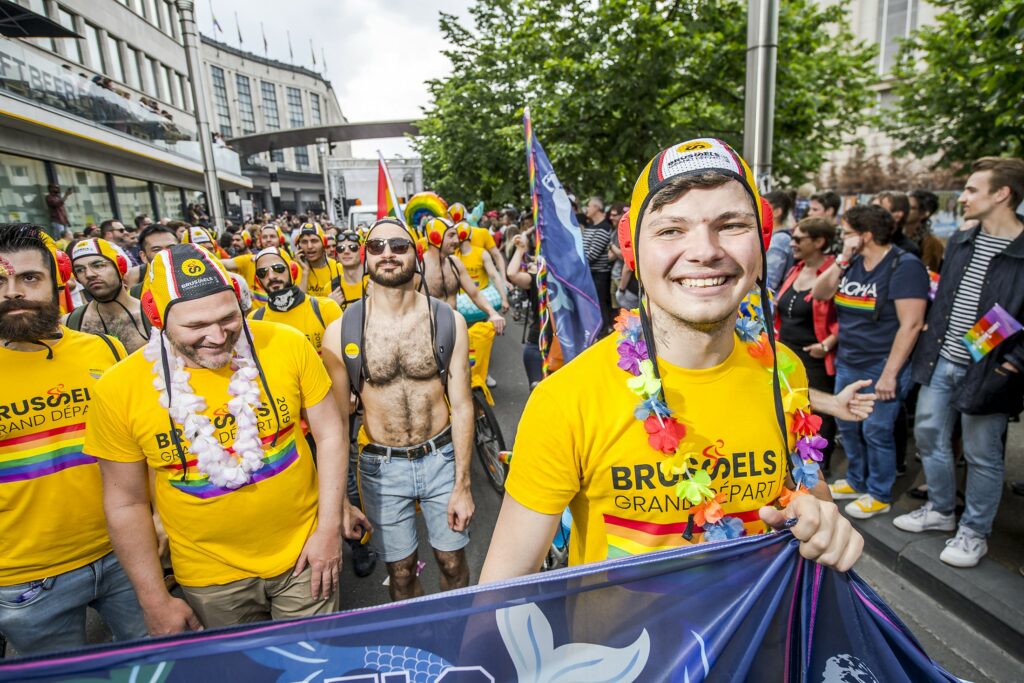“You should be burnt at the stake!”
That sentence still resonates in my head, more than 15 years after it was thrown at me. It was on a nice autumn night. I was walking along the Seine river in Paris. I could feel the fresh autumn air on my face but I didn’t care. I was just happy, holding the hand of my boyfriend. As we passed another walker, I heard him say this sentence in a barely muffled growl. My blood froze in an instant as if I had been slapped in the face. The walker did not stop. He did not act on his threat.
In the following days, I didn’t feel shaken nor alarmed. Just angry. Angry that at the beginning of the 21st century, some people could still feel so much hatred against others so as to verbalise death threats when crossing people in the street. Yet, I did not report this aggression.
Fortunately enough, I have not been the victim of such harsh verbal attacks since, nor of physical aggression for being gay, ever since I moved to Brussels. This is unfortunately not true for a lot of LGBTQI+ people, even in a country that is considered open such as Belgium. Just three weeks ago, David Polfliet was murdered in a park in Beveren, in what appears to be a crime motivated by the hatred of LGBTQI+ people. In that context, one can wonder if our rights are better protected in Belgium than in other countries. Are Belgium and its capital safe places for queer people?
LGBTQI+ rights in Belgium
To answer these questions, we can look first at the ILGA Europe Rainbow index that ranks all the 49 countries of Europe regarding their laws and policies to support and protect queer people.
This index is based on a list of all laws and policies that a country could adopt and implement in order to guarantee protection and non-discrimination of all LGBTQI+ people. For example, it covers protection against discrimination at work, family law, the protection against hate crime and hate speech, legal gender recognition for trans people, protection of body integrity for intersex people, the capacity to be visible in the public space and asylum rights for queer people in the country.
So, the index lists all the types of laws and policies that are demanded by LGBTQI+ associations worldwide. IGLA looks at how many of these laws and policies are adopted and implemented in each country in Europe – if you do everything, you have a 100% score, and if you do nothing you have a 0% score.
In 2020, Malta ranked first with a 89% compliance rate. Belgium ranked second, tied with Luxembourg, at 73%. This is okay, but it shows that there is still some work to do in Belgium in order to guarantee full rights and protection to LGBTQI+ people. In comparison, France is at 56%, Germany at 51%, Croatia at 46% and Hungary at 33%. Italy is the country of western Europe that ranks last with only 23%. At the bottom of this ranking, we find Russia at 10%, Turkey at 4% and Azerbaijan at 2%.
This index only describes the framework, the laws and policies in place, but not how they are implemented. Nor how they do, or do not, protect LGBTQI+ people in everyday life. So, how do queer people experience life in Belgium?
The feedback of LGBTQI+ people living in Belgium
A European survey of 140K LGBTQI+ people – conducted by the EU agency for Fundamental Rights in 2019 – provides us with a few elements to evaluate how safe queer people feel in Belgium.
Published in 2020 – with the evocative title of “A long way to equality” – the results of this survey tell us that:
- 56% of LGBTQI+ respondents living in Belgium think that the government effectively combats prejudice and intolerance (Ranking 9th – average is 33%).
- 34% of same-sex partners never or rarely avoid holding hands in public for fear of being assaulted, threatened or harassed (Ranking 16th – average is 39%).
- 37% of LGBTQI+ people often or always avoid certain places for fear of being assaulted, threatened or harassed (Ranking 10th – average is 34%).
- 42% experienced harassment due to being LGBTQI+ in the previous year (Ranking 4th – average is 38%).
- 14% experienced a physical or a sexual attack for being LGBTQI+ in the last five years (Ranking 3rd – average is 11%) with only 20% of them reporting such crimes to the police.
- 22% didn’t report a physical attack out of fear of homophobic or transphobic reaction when reporting such an attack to the police.
This data shows us that even in an open country like Belgium and an open city like Brussels, there is still a lot that can be done so that LGBTQI+ people feel safe and protected in their everyday life.
An important action that could help highlight the issue of LGBTQI+ safety would be for every attack and discrimination of any sort to be reported in order to build a more accurate view of the current situation of queer people in the city. Currently, there are two structures to which such attacks can be reported in Belgium:
- Unia – the Interfederal Centre for Equal Opportunities, that deals with homophobia or the discriminations based on sexual orientation.
- The Institute for the Equality of Men and Women, that deals with transphobia, discrimination of intersex people, and all discrimination related to gender identity and gender expression.
Unlike what I did 15 years ago, it is important to report any aggression or verbal assault to these structures so that the data they gather reflect the reality of the situation of LGBTQI+ people in Belgium.
You can do so through the following means:
- By phone – use the hotline to report an attack, an incident or a discrimination: 0800 12 800
- Report an attack, an incident or discrimination based on sexual orientation to Unia : https://www.signalement.unia.be/en/report-it
- Report an attack, an incident or discrimination related to sex or gender to the Institute for the Equality of Men and Women: https://apps.digital.belgium.be/forms/show_/igvm/complaint/latest?lng=fr
Reporting all incidents is a first step in highlighting the issue to politicians in order to build momentum so that, soon enough, Belgium reaches the 100% score on the ILGA Rainbow Index.
Listen to KET Talks Podcast now on Spotify, YouTube, IGTV, Deezer and Apple Podcasts! Enjoy this fifth episode of the Brussels queer podcast and feel free to give us your feedback on Facebook and Instagram.
You may also like
-

Laetitia BICA : If there’s nothing at stake, why play?
Driven by her Sicilian roots and passion for photography, Laetitia BICA challenges industry norms through
-

LGA-Europe’s Equality Fundraiser Gala in Brussels
On July 4th, ILGA-Europe hosted their Equality Fundraiser 2024 in the Brussels Region, drawing around
-

Guggenheim Bilbao: A Beacon Of Inclusion With Queer Destinations Certification
The Guggenheim Museum Bilbao is breaking new ground as the first international museum to receive
-

Grindr Used to Trick Gay Men in Western Brussels
A Surge of Homophobic Ambushes Source: Le Soir In the latter half of June, western
-

A Celebration of Courage: Chille Deman Receives Citizen Medal from the City of Brussels
In a heartwarming ceremony held on May 17th, the International Day Against Homophobia, the City
